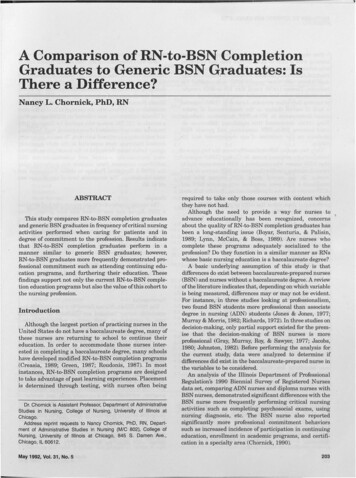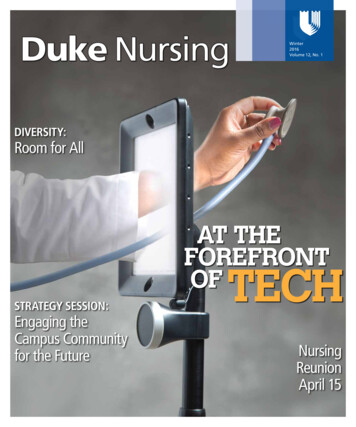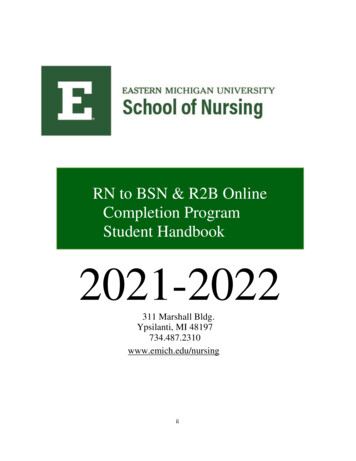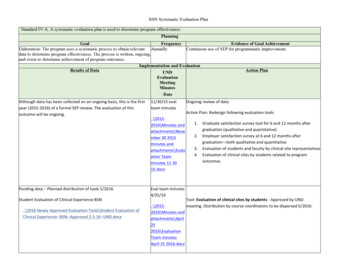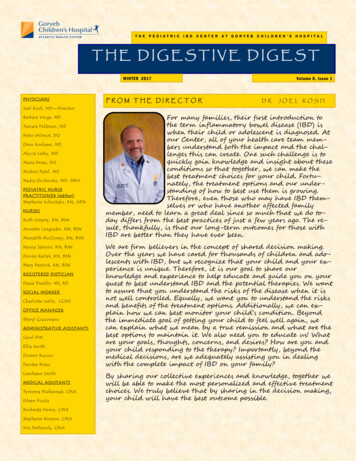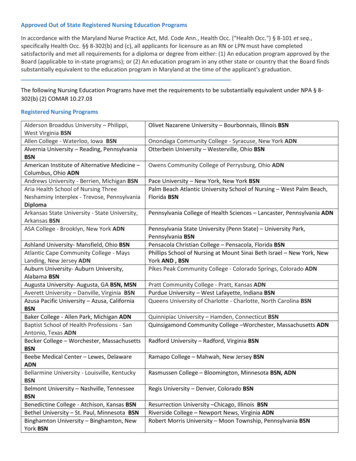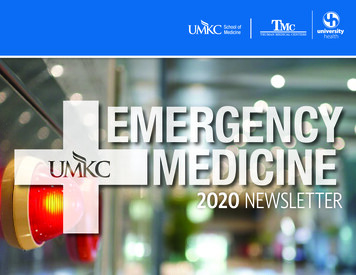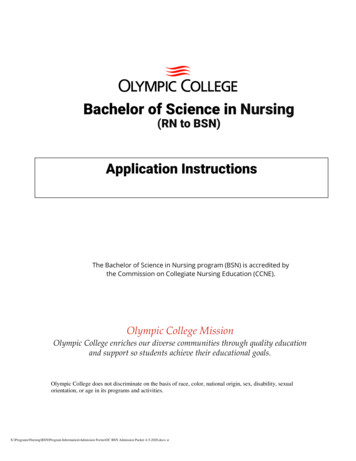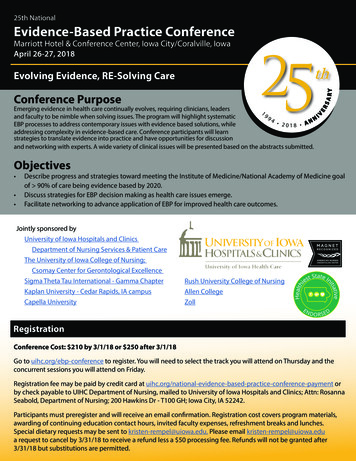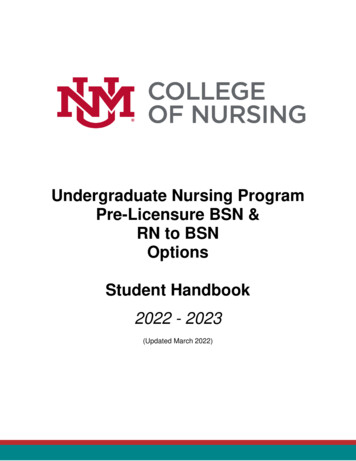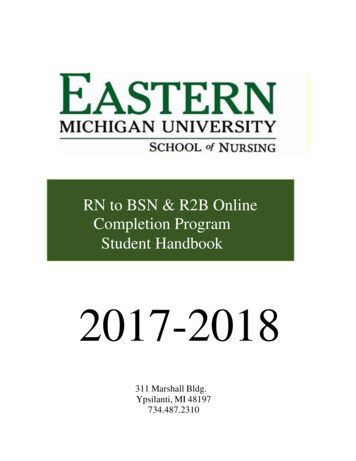
Transcription
RN to BSN & R2B OnlineCompletion ProgramStudent Handbook2017-2018311 Marshall Bldg.Ypsilanti, MI 48197734.487.2310
www.emich.edu/nursingThe Eastern Michigan University School ofNursing EmblemThe three circles represent:The health-care delivery systemPeople and their environmentThe health-illness continuumThe arrow bisecting the three circles represents the nursing process.The content of this Handbook is subject to revision at any time. The University and the School ofNursing right to revise includes, but is not limited to, policies, programs, grading guidelines,graduation requirements, courses, services, fees, and personnel.ii
Table of ContentsWelcome! . vGeneral, But Important, Information . 1Policies Affecting You at EMU . 1NURSING CURRICULUM . 2RN to BSN Completion Curriculum: Required Nursing Courses . 2GENERAL INFORMATION .3Student Orientation . .3Syllabi . 3Participation/Attendance Expectations . 3Assessment/Evaluation of Learning . 4Writing Intensive Coursework . 4APA Style . 5Professional Integrity . 5Program Grading Scale . 5Academic Problem Solving Sequence . 6School of Nursing Complaint Policy . 7Academic Advising . 8Practice Experience – Capstone Course . 9Mandatory Requirements . 9OSHA & Communicable Disease Policy . 10Ethics in Communicable Disease and Patient Care . 10Incident Occurrences . 11Dress Code for Clinical Capstone Activities . 11Transportation . 12Course Fees . 12PROGRESSION POLICIES . 12INTERRUPTED BSN PROGRAM OF STUDY . 15Policy for ALL Returning Students . 15Repeating a Nursing Course . 15Procedure for Returning After Receiving a Failing Grade . 16Student Appeal Process for Reinstatement to the Program . 16Permanent Dismissal . 16University Academic Probation 16GRADUATION POLICIES . 17Graduation Audit . 17Application for Graduation . 17Graduation Ceremonies . 17iii
APPENDICES . 18APPENDIX A . . 19E-mail Guidelines For Students .19APPENDIX B .23Unsafe Practice Guidelines . 23APPENDIX C . 24History . 24Legal Operating and Professional Accreditation . 24APPENDIX D . 25EMU Mission Statement . 25School of Nursing Philosophy . 25School of Nursing Mission Statement . 26BSN Program Goals (revised and approved 3/16/09) . 26Program Level Student Learning Outcomes (revised and approved 3/16/09) . 26APPENDIX E . 27Overview of the AACN Essentials . 27APPENDIX F . 28Additional Resources for Students . 28APPENDIX G . 30Student Input Processes . 30Individualized Learnin gExperiences . 31APPENDIX H . 33International and Foreign Student Information . 33APPENDIX I . 34Complaint Form . 34APPENDIX J . 35Incident Policy . 35Incident Report Form . 37APPENDIX K . 39School of Nursing Faculty & Staff Roster . 39iv
Welcome!Dear Nursing Student:CONGRATULATIONS and welcome to the School of Nursing at Eastern Michigan University!On behalf of the faculty and staff I want to welcome you and let you know that we are here tosupport you in your journey to a completing your BSN degree! As you know, nursing is verychallenging and advancing your academic credentials is one way to meet those challenges. Thecourse work can be difficult and even frustrating at times. Do not hesitate to ask questions or seekassistance when you need it. Program coordinators are available to you—reach out to them, askthem for resources that you need and turn to them if you’re struggling!This handbook contains many important policies and guidelines specific to the BSN completionprogram and you at EMU. This handbook stands as a supplement to the university’s PoliciesAffecting You at EMU that serves as the overall student policy manual. These guidelines shouldserve as your roadmap to successful completion of the BSN program.In a very short period of time, you will have completed the BSN program at EMU! We lookforward to celebrating with you at the School of Nursing Convocation and Pinning Ceremonyindicating that you have completed all the requirements for the BSN!Regards,Michael L. Williams, PhD, RN, CCRN, CNEDirector & Associate Professor,School of Nursingv
August 1, 2017Dear BSN Nursing Students:We are pleased to extend a warm welcome to you on behalf of the Undergraduate Committee forAdmission and Retention of Students (UCARS), Undergraduate Curriculum and Instruction Committee(UCIC), and all nursing faculty at EMU. This handbook was developed through input from faculty andprevious nursing students to assist you in progressing through the nursing major. It is your obligation toreview the contents of this handbook, as you will be held responsible for its contents throughout yourprogram of study within the School of Nursing.The program you are entering is designed to prepare you to:1. Respect the dignity and worth of humans while providing holistic care in a variety of healthcaresettings.2. Assume accountability for own and delegated nursing care to individuals, families, groups,communities, and populations.3. Practice from an evidence base to promote safe, quality patient care for diverse patients acrossthe lifespan and health-illness continuum.4. Use critical thinking, clinical reasoning, ethical inquiry and leadership skills to collaborate withconsumers and healthcare providers to address simple to complex health situations.5. Care for self while engaging in continuous professional development.Your presence here indicates your commitment to learning or expanding on your knowledge of the nursingprofession at Eastern Michigan University. Faculty expect you to be an active participant in identifying andmeeting your learning objectives as well as self-evaluation of your progress.In the days ahead you will make new friends, experience new struggles, and take steps toward lifelonglearning as a professional registered nurse. You will have many opportunities to learn from and workwith health care professionals in a variety of settings such as community health agencies, publicschools, clinics, nursing homes, hospitals, and emerging new community health facilities.We are pleased that you have chosen EMU’s nursing program and hope that you have a rewarding,satisfying, and successful experience with us.Sincerely,Undergraduate Curriculum and Instruction Committee (UCIC)Undergraduate Committee on Admission and Retention of Students (UCARS)vi
General, But Important, InformationName/Address/Phone Number ChangeIt is your responsibility to immediately notify the University Records Office and the Schoolof Nursing of any name, address, e-mail or telephone number change(s). This is now possiblethrough the my.emich services tab online. We also ask that you provide an updated address, email and telephone numbers upon graduation so we can keep in contact with you as an alumnus.Student Records and ReferencesConfidential academic files for each student are maintained by the School of Nursing. Astudent's file contains the admission application, clinical evaluations, grade reports, certificates,health records, and advising notes. If a student wishes to access that file, a written request mustbe submitted to the School Director and an appointment made to review the file. Students mayrequest copies of materials in the folder with 48 hours advance notice.Announcements & Electronic CommunicationThe School of Nursing uses primarily electronic means (e-mail) to communicate withstudents. It is the responsibility of each EMU nursing student to check their my-emich e-mailfrequently for important announcements, information and messages. The my.emich e-mailsystem is the required system for communication between students and faculty/staff/School ofNursing. The faculty of the School of Nursing recognize the importance of presenting oneself ina professional manner when communicating through e-mail. Appendix A provides valuableguidelines for professional e-mail communication.The School of Nursing has established a website: www.emich.edu/nursing. This site providesa wide variety of information about the program and student organization/activities as well aslinks to faculty and other sites.EMU Student HandbookEach year, Eastern Michigan University makes available School of Nursing student policiesand other important information in the EMU Student Handbook. These are published on theuniversity’s website. To access the handbook, go to www.emich.edu and type in “StudentHandbook” in the search bar. The Eastern Michigan University Student Handbook containsinformation for students about available university services, university policies and procedures,and helpful information to aid in student success. The School of Nursing Student Handbook canbe accessed by going to www.emich.edu and typing in “Nursing Student Handbook.”1
NURSING CURRICULUMThis handbook is specifically prepared for students admitted to the RN to BSN Completion(fully online and hybrid) at EMU.RN to BSN Completion Curriculum: Required Nursing CoursesThe Essentials of Baccalaureate Education developed by the American Association ofColleges of Nursing are responsive to the changes occurring in the discipline and within thepractice of professional registered nurses. As such, this framework is seen as the mostcontemporary and proactive structure for continuous improvement in nursing education for EMUstudents. The undergraduate nursing curriculum for the RN to BSN student includes the coursesin the table below. These courses are offered as 7-1/2 week online courses given in a carouselformat and as 15 week hybrid courses at satellite locations. All students take NURS 300 astheir first course and NURS 483LR as a final capstone course. All courses must be completedwith a minimum grade of C (2.0 on a 4.0 Scale) in order to progress in the program.BSN Completion CurriculumCourse #NURS 300Course Name/creditsReading and Writing in Nursing StudiesNURS 221Health Assessment for RNs3 cr.NotesPrerequisite for other NURScoursesPrerequisite for NURS 483L4NURS 2653 cr.Prerequisite for NURS 483L43 cr.Prerequisite for NURS 483L4NURS 374R.N. Essentials of Professional NursingPractice: The Professional RoleR.N. Essentials of Professional NursingPractice: Nurse as AdvocateNursing Research Concepts for Practice3 cr.Prerequisite for NURS 483L4NURS 453Community-based Nursing for RNs3 cr.Prerequisite for NURS 483L4NURS 465R.N. Essentials of Professional NursingPractice: Nurse as LeaderAdditional Nursing (NURS) coursework3 cr.Prerequisite for NURS 483L46 cr.Prerequisite for NURS 483L43 cr.Satisfies Learning Beyond theClassroom requirement (GELB)NURS 365WNURS XXXNURS 483LRRN to BSN Population Focused CapstonePractice ExperienceTotal credit hours2Credits3 cr.30 cr.
Effective Fall 2017, the BSN completion program has been revised to allow students to complete 30 creditsin the BSN major courses. For students who started the BSN curriculum prior to Fall 2017 the table belowindicates course numbers for both the prior courses and the new courses. Students who completed 2 creditcourses in the earlier program plan must take additional courses at EMU to complete the 30 credits ofEMU coursework required for degree requirements.Old Course#IHHS 200NURS 220NURS 265NURS 365WOld Course Name/ creditsNew Course #New Course Name/ creditsReading and Writing in NursingStudies/ 3cr.Health Assessment/ 2cr.R.N. Essentials of ProfessionalNursing Practice I/ 3cr.NURS 300R.N. Essentials of ProfessionalNursing Practice II/ 3cr.NURS 365WReading and Writing in NursingStudies/ 3cr.Health Assessment for RNs/ 3cr.R.N. Essentials of ProfessionalNursing Practice: TheProfessional Role/ 3cr.R.N. Essentials of ProfessionalNursing Practice: Nurse asAdvocate/ 3cr.Nursing Research Concepts forPractice/ 3cr.Community-based Nursing forRNs/ 3cr.RN to BSN Population FocusedCapstone Practice Experience/3cr.R.N. Essentials of ProfessionalNursing Practice: Nurse asLeader/ 3cr.Additional Nursing (NURS)coursework/ 3cr.30 cr.NURS 221NURS 265NURS 372Nursing Research/ 2cr.NURS 374NURS 450Community Health Nursing/ 3cr.NURS 453NURS 451Community Health NursingClinical/ 2cr.NURS 483NURS 465R.N. Essentials of ProfessionalNursing Practice III/ 3cr.NURS 465NURS XXXTotal cr.Additional Nursing (NURS)coursework/ 5 cr.26 cr.NURS XXX3
GENERAL INFORMATION ABOUT THELEARNING EMVIRONMENTStudent OrientationR2B Fully Online ProgramStudent “orientation” occurs over multiple weeks via email prior to starting the R2Bprogram. Introduction to University resources including the online learning system is included inthe orientation. All new nursing students receive information about how to access the StudentHandbook and important policies, procedures, and guidelines within the School.RN to BSN In-seat ProgramAll new nursing students receive information about how to access the Student Handbookand important policies, procedures, and guidelines within the School and University. Students arealso given information on textbooks and syllabi and questions will be answered.SyllabiEach course has a syllabus which describes the course, the course objectives, courserequirements, grading system, deadlines and dates, assignments, and quiz and test policies.Students are expected to meet all course objectives. Failure to meet deadlines reflects an inabilityto meet course objectives for professional accountability and will affect the student's grade. Thesyllabus serves as a student-faculty contract for meeting course requirements. Extenuatingcircumstances may necessitate modifications in the course and syllabus. Students will benotified of changes.Participation/Attendance ExpectationsStudents are expected to participate in all learning experiences. Failure to completeassignments, participate in online discussions or meet course objectives may lead to coursefailure. Students are expected to communicate with course faculty should problems arise.Opportunities for late submission or make-up assignments are determined by the faculty assigned tothat course and described in the clinical course syllabus. Repeated absences, tardiness, or failureto meet course objectives may lead to course failure. If a student cannot be in clinical at anassigned time, the instructor must be notified in advance of the time the clinical begins.Assessment/Evaluation of LearningAssessment/Evaluation focuses on the student’s ability to analyze, synthesize, and applylearning from her or his liberal arts education and all of the Essentials of Professional Nursing tothe practice of professional nursing. A variety of assessment/evaluation methods are used todetermine the learner’s ability to understand and integrate knowledge (e.g. faculty-developedtests, nationally standardized tests, written assignments, presentations, online threadeddiscussions, clinical evaluation tools, and others).Writing Intensive CourseworkMost courses with the RN to BSN Completion program require written assignments.NURS 365W RN Essentials of Professional Nursing Practice II is designed to enhance thestudent’s abilities to clearly, concisely, and accurately convey their thinking in written formatusing proper APA style and conventions. Writing resources will be identified in each course tosupport student achievement of the course.4
American Psychological Association (6th Edition) StyleAll assigned papers must be written using the format outlined American PsychologicalAssociation Publication Manual (APA); 6th ed. Students are expected to utilize and cite the mostcurrent or relevant reference sources.Professional Integrity is Mandatory.Plagiarism is use of another's words, data, materials, or ideas without crediting the source.Students are not to engage in any form of professional dishonesty including, but not limited to,alteration of patient records, changes in patient condition, treatment or plan, falsification ofpersonal or patient records, and submitting the work of others as one’s own. When writingacademic papers, students are expected to cite the ideas of others using APA conventions.Program Grading ScaleThe grading scale listed below is used in both classroom and clinical courses.PASSINGFAILINGA 100-94C- 74-70A- 93-90D 69-66B 89-87D 65-63B 86-84D- 62-60B- 83-80F 59 OR BELOWC 79-78C 77-755
Academic Problem Solving Sequence*Note: Only the end of semester course grades are subject to a grade grievance. A copy of theUniversity’s Grade Grievance Procedure can be obtained online ms/grade grievance.pdf .“Disagreement with an instructor’s judgment in and of itself is not a basis for a grievance nor is disagreementwith an instructor’s grading standards, if such grading standards have been described in advance for theclass, and have been applied fairly to all students in the class.” (Grade Grievance Procedure, 2000. p. 5)6
School of Nursing Complaint PolicyEastern Michigan University School of Nursing believes that if a student, staff, faculty, orservice recipient wishes to make a complaint or register a concern they should find it easy to doso. It is the School’s policy to welcome complaints and look upon them as an opportunity tolearn, adapt, improve and respond to perceived problems. This policy is intended to ensure thatcomplaints are dealt with properly and that all complaints or comments by the complainant aretaken seriously.A complaint is a statement of dissatisfaction with a situation; and expression of displeasure. TheEMU School of Nursing believes that failure to listen to or acknowledge complaints will lead toan aggravation of problems, further dissatisfaction, elevation of the complaint, and possiblelitigation. If the complaint is dealt with early, openly and honestly, further action on thecomplaint can be eliminated or managed more appropriately.The aim of this policy is to ensure that its complaints procedure is properly and effectivelyimplemented and that stakeholders feel confident that their complaints and concerns are managedpromptly, fairly, and sensitively with due regard to the concern of the complainant.The EMU School of Nursing believes that, wherever possible, complaints are best dealt with ona local level between the complainant and the person with whom the complaint is against.Therefore, any complaint voiced to any person employed by the EMU School of Nursing isresponsible for accepting the complaint and following it through this policy. If either of theparties is not satisfied by a local process the case should be referred to the appropriatedepartment and/or administrative office as needed. See Appendix I for Complaint Form and alist of resources.7
Academic AdvisingUpon admission to the Nursing Program, each student is responsible for contacting theCollege of Health and Human Services advising center 734-487-0918 or their website athttps://www.emich.edu/chhs/advising/ . Students in the RN to BSN program must identifythemselves to the academic adviser as a RN to BSN student to receive the correct information.Student Responsibilities with Academic Advising: Students are expected to maintain and bring with them their personal copies ofadvising forms, course substitution forms, and other forms relevant to programprogression. Students are expected to follow through to resolve issues on advising concerns. Students should notify the Nursing Coordinator if there is a change in their status(dropping out of the program, potential failure in a course, significant life circumstancesthat will prevent academic progression, etc.). Students are responsible for assuring all transcripts from other schools are received inthe EMU Records Department. Before the final semester in the program, students may verify their progresstoward graduation as described at http://www.emich.edu/registrar/uachieve/ . Students are expected to submit an application for graduation in the beginning ofthe semester in which they plan to graduate. Specific deadlines and forms areavailable online from the Records and Registration websitehttp://www.emich.edu/registrar/.8
Practice Experience – Capstone CourseThe Capstone course is designed to enhance student learning in applying theory tonursing practice. Students will identify a preceptor to work with to complete a Capstone Project.The Capstone Course (NURS483) is taken as the final course in the Nursing Curriculum; all otherNURS courses must be completed with a grade of C or better (2.0 on a 4.0 scale) as a prerequisite.The Capstone course allows the students to demonstrate their ability to apply and articulateprogram outcomes. Students will be informed in the semester prior to their Capstone course ofresponsibilities and preparation. Students are expected to be aware of the specific criteria ofunsafe practice. These are located in Appendix B of this Handbook.Mandatory Health-Related and Other Requirements for Capstone CourseAgency RequirementsAffiliating agencies used by the EMU School of Nursing have specific regulations to whichstudents and faculty must comply. Generally, the health requirements below, as well as universalprecautions, fire safety, body mechanics, and other clinical agency issues, may be managedthrough the ACE Passport System.RN to BSN nursing students will meet the specific regulations for their clinical facilities whichmay or may not require use of the ACE Passport System. It is ultimately the student'sresponsibility to assure that they meet clinical agency requirements--failure to do so may result inremoval from the clinical agency and delay in program completion. Students must be free fromsigns and symptoms of active communicable disease when caring for clients in clinical settings.Students enrolled in any clinical/practice nursing courses will be required to provide one copy ofdocumentation for the following health-related requirements to the School of Nursing Officeprior to the first day of clinical each term unless a specific agency has another due date:1. Proof of Personal health insurance.*2. A report of current physical examination upon entry to the program (report must be on file).3. Proof of immunity or antibody titer or two doses of vaccine of the following:a. Rubellab. Mumpsc. Rubeolad. Varicella Zostere. Tdap4. Proof of tetanus vaccination within the past five years of the time of admission.5. Proof of having begun the Hepatitis-B series or submission of a signed Declination Form6. Annual influenza vaccination as required by clinical site.7. Annual documentation that the student is free from Tuberculosis.8. Documentation of current Adult, Child, Infant, Two-Person CPR certification forthe professional rescuer or CPR for the Health Care Provider.9. Drug screen: at least a 7-panel drug screen must be obtained at the student’s cost.A positive drug screen may result in being excluded/removed from the clinicalagency.10. Depending on the preceptor location, some facilities may require ACEMAPPapproval. There is a fee associated with ACEMAPP which is the individualstudent’s responsibility.9
*Note: Those students who do not have access to health insurance may obtain it through theUniversity. Information is available at Snow Health Center. Students who cannot afford this maycontact the Michigan Department of Community Health. Students with extenuatingcircumstances should contact the BSN Program Coordinator in writing no later than the first dayof classes each semester.OSHA and Communicable Disease PoliciesThe faculty of the School of Nursing subscribe to the Guidelines from OSHA on the control ofcommunicable diseases. Safety regarding patient care includes:STANDARD PRECAUTIONS are recommended by the Centers for Disease Control as amethod to prevent the spread of blood and fluid borne disease including AIDS and Hepatitis B.These precautions require that regardless of diagnosis, every patient is regarded as though he orshe is potentially infectious.OSHA Standards:The following Federal provisions of the Occupational Safety and Health Administration(OSHA) Standards are to be followed prior to student affiliation in clinical practice sites:1. Students will receive OSHA training annually through the ACE Passport System or attend anannual training session. Content of the training will include such topics as: blood-bornediseases (their transmission, expos
Each year, Eastern Michigan University makes available School of Nursing student policies and other important information in the EMU Student Handbook. These are published on the university's website. To access the handbook, go to www.emich.edu and type in "Student Handbook" in the search bar.
